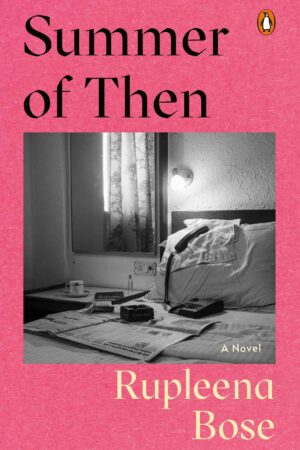Summer of Then
A young English literature teacher negotiates between her writing and her livelihood, her morality and her heart, her selfhood and her family’s history. She moves between cities, seasons and two men: Nikhil and Zafar—their lives getting entangled across a decade of restlessness and upheavals, their paths defined by questions of identity, desire and betrayals.
Summer of Then is a debut novel that relishes the interiority of women, especially the often-unsettling intimacies of relationships—sexual, romantic and platonic—against the trauma of sexual assault and harassment. Set across Calcutta, Delhi, Mumbai and Edinburgh, Scotland, this coming-of-age novel crosses paths with the India of the 2010s, exploring the trickle-down effect of politics on the academia and college life in Indian metropolitan cities, leading us just to the point of the incipient anxieties and beginnings of the next decade.
In the vein of Sally Rooney’s Normal People and Ottessa Moshfegh’s My Year of Rest and Relaxation, Summer of Then employs a sparse yet deeply compelling voice and introspective, observational commentary to evoke precise emotional and social detail.
Request more informationOriginal Language
ENGLISH (Indian Subcontinent) | Vintage/PRH India
Reviews
“Using spare, deceptively unostentatious prose, Summer of Then takes us on a journey of deepening emotions, a narrative trip that stretches from Calcutta to Edinburgh via Delhi, that traverses a decade. Bose obliges us to think about the heavy subjects of love, desire, violence, selfhood, memory and creativity, but she does so with a deftly light touch that is rare in first-time authors.” Ruchir Joshi, author of The Last Jet-Engine Laugh
“Urgent, resonant, a powerful debut that examines the traumas and triumphs of youth and a fast-fading past.” Prayaag Akbar, author of Leila
“A novel ser in a moment suspended between time and timelessness, examining the shifting sands of memory as the narrator navigates the eddies of love, hurt and acceptance.”
Namita Gokhale, writer and editor
"Bose’s prose is spare, lucid and elegant, ruminative without veering into excessive self-indulgence." Preeti Zachariah, The Hindu Lit Review
“There are times when one’s words threaten to burst out of oneself, leading to a deluge of thoughts, hurt, feelings, and wonder. Summer of Then is a similar explosion of interiority. From an evening that offers unusually clean air and bright stars to a dawn that is suffocated by disease and miasma, a decade-long story unfolds, full of longing, betrayal, memory, desire, and love.” The Telegraph India
“Bose’s novel is an urgent read. It lays bare the grime behind the glossy life of an academic in India. It makes evident the fluidity of desires women feel without voicing it. … It clears the air to make Indian writing in English remain relevant without pining for another Roy or Seth. It is a fresh voice that deftly captures yearnings, memories, grief, desperation and hunger of a woman.” Rahul Singh, The Federal
“Summer of Then is of course about the narrator’s ever-changing emotional and mental landscapes, but it is also about the body at large. The impenetrable bodies of class and caste, cities, and nation; the frailty of our hearts and bodies that desire and fall in love with what is solidly out of reach; and how the layers of hopes and memories that accumulate over time on these bodies disillusion us from reality and prevent us from seeing ourselves as creatures stuck like pesky gnats on these unforgiving bodies.” Sayari Debnath, Scroll.in
"Compared with the magnitude of a decade of political change, economic collapse and religious polarization, the narrator’s personal stories might seem small but are not insignificant. The universal and the personal parallel each other in the novel, drawing each other out until there’s no telling them apart." Tanushree Bhasin, New Lines Magazine
“This book is an absolute triumph.”
The Indian Bookclub
“Set across three Indian cities and Scotland, this deeply moving novel explores the effect of politics on academia. … There is love, longing, betrayal in Bose’s novel. But importantly, it also dwells on the intimacies of relationships—sexual, romantic and platonic—against the trauma of sexual assault and harassment.” Asian Age
“Rupleena Bose allows the nameless, all too human protagonist of her debut novel to be selfish without regrets.” Mint
“Rupleena Bose displays real skill in understanding the complexities of human interactions with ease and craft. The prose is a study of modern manners and throws light on the inner machinations of contemporary society. Her style is light and lyrical, perhaps the best way to handle such intangible forces of the fast-changing society.”
Sarnath Banerjee, filmmaker and author of Corridor and Doab Dil
